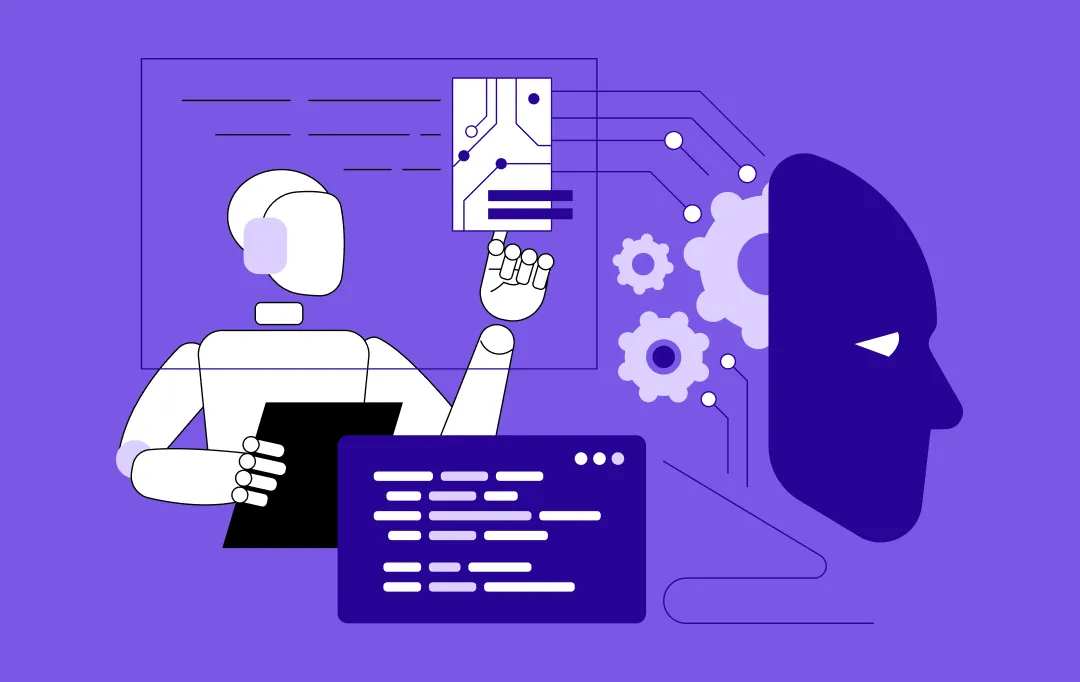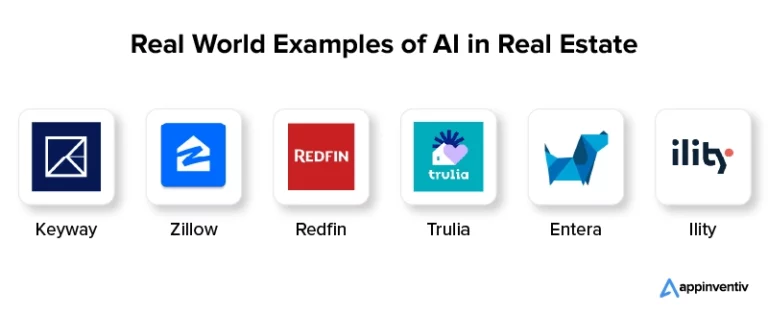- Top 16 Applications of AI in Real Estate
- Listing Descriptions
- Virtual Property Tour
- Property Valuation
- Investment Analysis
- Property Management
- Fraud and Compliance Detection
- Property Search
- Personalized Recommendations
- Property Analysis
- Marketing & Customer Service
- Intelligent Data Processing
- Predictive Analytics
- Portfolio Optimization
- Lease Management and Documentation
- Automated Property Valuation
- Risk Analysis
- Real-Life Examples of AI in Real Estate
- Ility
- Keyway
- Zillow
- Trulia
- Redfin
- Entera
- AI Integration in Real Estate: Key Focus Areas Businesses Need to Look Out For
- Property Valuation and Pricing
- Predictive Analytics for Market Trends
- Real Estate Investment
- Property Search and Matching
- Virtual Tours and Augmented Reality
- Smart Building Management
- Automated Document Management and Contract Generation
- Lead Generation and Customer Engagement
- Construction and Project Management
- Fraud Detection and Risk Mitigation
- Maintenance and Facility Management
- Leveraging AI for Faster Decisions, Better Prices, and Happier Tenants
- How Generative AI in Real Estate Market Will Transform the Market Dynamics
- How Agentic AI is Transforming Real Estate Operations
- The Road Ahead: Challenges and Opportunities in AI Adoption for Real Estate
- Regulatory and Compliance Concerns
- Implementation Costs
- Data Quality and Security
- Bias and Lack of Human Intuition
- Balancing Human and AI Roles
- Ethical AI and Algorithmic Fairness
- Integration with Legacy Systems
- The Future of Artificial Intelligence in Real Estate: With Actionable Steps
- Develop Custom AI Real Estate Solutions with Appinventiv
- Frequently Asked Questions (FAQs)
Key takeaways:
- AI Enhances Efficiency: Automates repetitive tasks, allowing agents to focus on building client relationships and closing deals.
- Personalized Property Matches: AI-powered recommendation systems offer tailored property suggestions based on buyer preferences and behaviors.
- AI-Driven Market Intelligence: Machine learning algorithms predict market trends, identify investment opportunities, and provide real-time competitive analysis for strategic decision-making.
- Data-Driven Decision Making: AI-driven analytics optimize pricing strategies, market trends, and portfolio management for smarter investment choices.
AI is driving major transformation across industries, with real estate seeing one of the biggest shifts. Machine learning and AI in real estate have opened up a new era of business intelligence and operational efficiency, changing how industry leaders handle property transactions. With its strong ability to analyze market data, predict trends, and automate complex processes, AI is creating a shift that changes how executives buy, sell, and invest in properties across the entire real estate system.
Not surprisingly, the future of real estate depends heavily on AI solutions. The technology has made property management more efficient, streamlined, personalized, and customer-focused.
According to the Business Research Company, the AI in real estate market size will grow from $222.65 billion in 2024 to $975.24 billion in 2029, at a compound annual growth rate (CAGR) of 34.1%. This huge growth is driven by multiple strategic factors, including market analytics and forecasting capabilities, the rise of chatbots and virtual assistants for better customer service, and advanced machine learning in real estate algorithms that change property valuation and prediction methods.
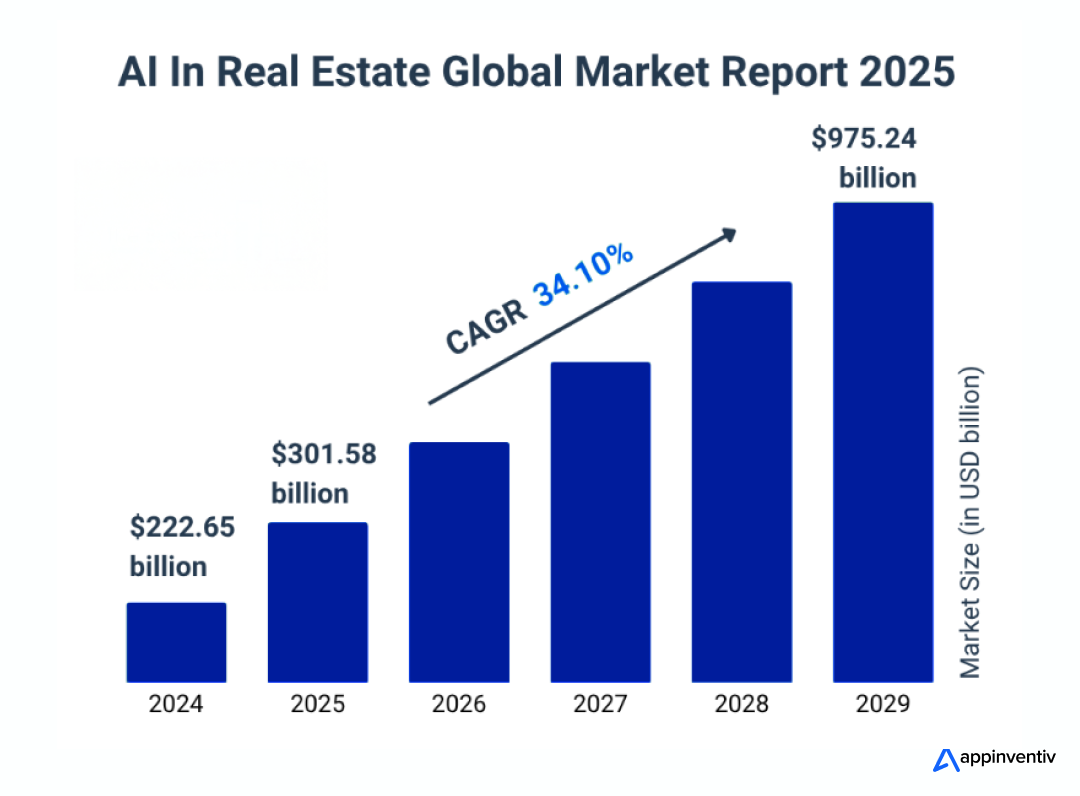
Generative AI applications in real estate are revolutionizing real estate operations by automating complex processes and delivering intelligent insights across all business functions. Using AI in real estate empowers executives to make faster, data-driven decisions while optimizing operational efficiency.
Core transformation areas:
- Acquisitions – Automated market analysis and investment feasibility assessments for accelerated decision-making
- Investor Relations – Dynamic stakeholder reporting and presentation generation through intelligent automation
- Business Support – Streamlined HR, IT, and legal processes via AI-powered workflows
- Asset Management – Enhanced portfolio analytics and predictive performance optimization
- Finance and Accounting – Intelligent financial reporting and automated compliance documentation
- Property Operations – AI-driven tenant services and dynamic facility management systems
Real estate leaders leveraging GenAI achieve reduced operational costs, faster transaction cycles, and superior stakeholder experiences while maintaining competitive market advantages. For anyone confused on will AI replace real estate agents, the answer is a clear no as it will work more in cohesion and not as a separate agent.
This blog examines how AI applications in real estate is shaping the industry, looking at 16 key applications, actual examples from the field, how to put these systems in place, and the obstacles companies face along with practical solutions.
Top 16 Applications of AI in Real Estate
Back in 2018, we saw the first big AI move in real estate when a company bought two Philadelphia properties worth $26 million. They used an algorithm that could spot buildings about to hit the market before anyone else knew. That was just the beginning – since then, these smart systems have taken off like crazy and pushed the whole industry into new territory.
By leveraging AI technology in real estate, professionals are finding innovative ways to transform the industry, which is having a real impact on business operations. Here are the most impressive AI use cases in real estate that are being put to work in real estate today.
Listing Descriptions
AI in real estate takes care of the tedious task of cranking out listing descriptions on autopilot. Sure, there are plenty of ready-made software options that do a decent job with property listings, but you could also create your own custom solution or plug an AI model like ChatGPT into whatever system you’re already using.
You could build your own real estate AI tool and feed it a specific prompt about the property details to spit out a template – you’ll have a rough draft in seconds. Then you can reuse that template whenever you need to write up a new listing.
Key Technical Components:
- NLP Models – Advanced language processing systems like GPT and BERT
- Real Estate Training Data – Property features, neighborhood details, and proven listing language
- Fine-Tuning Process – Models are specialized using real estate-specific datasets
- Contextual Generation – Creates relevant, engaging descriptions tailored to each property
How It Works:
The system analyzes successful listing patterns and property characteristics to generate descriptions that appeal to potential buyers while maintaining accuracy and relevance and is considered among the most important AI use cases in real estate.
Virtual Property Tour
AR, VR, and metaverse tech in real estate are making it possible for potential buyers to get a real feel for properties without actually visiting them – it’s a perfect example of how AI in the real estate industry is making work better. Agents can now give buyers virtual walkthroughs that really capture what it’s like to be in the space.

This innovation in real estate artificial intelligence is particularly useful for properties that are still under construction or living in other countries. It also helps keep people at a safe distance and stops pre-scheduled showings from jamming up an agent’s schedule.
Key Technical Components:
- 360-Degree Photography – Captures complete room views from multiple angles
- LiDAR Scanning – Uses laser technology to measure precise distances and dimensions
- Computer Vision Processing – Analyzes visual data to understand spatial relationships
- Spatial Mapping Networks – AI systems that create accurate 3D property models
- Real-Time Rendering – Displays interactive environments instantly as users navigate
How It Works:
The technology combines high-quality visual capture with AI-powered processing to build detailed 3D reconstructions. Users can then explore these virtual spaces through interactive extended reality (XR).
Property Valuation
When people ask how AI in real estate works, property valuation often comes up first. AI-powered valuation platforms can automatically assess property values using complex algorithms that analyze market data, comparable sales, and property characteristics. Buyers and sellers get accurate pricing insights, making transactions more transparent and efficient. Properties are priced optimally, and negotiations become more data-driven when people have reliable valuation estimates.
It works by processing vast amounts of market information, letting stakeholders make informed decisions without relying solely on traditional appraisal methods. This cuts way down on valuation time and costs while helping people decide faster, which streamlines the entire buying and selling experience.
Key Components:
- AI Models – Machine learning algorithms and neural networks
- Training Data – Historical sales and market trend information
- Market Analysis – Comparative market assessment capabilities
- Dynamic Pricing – Real-time valuation adjustments
The system analyzes property features and generates accurate valuations that reflect current market conditions and neighborhood dynamics.
Investment Analysis
Getting profitable investments keeps any business alive, and real estate isn’t different. AI and ML in real estate helps investors identify lucrative opportunities from places like market data, financial reports, property metrics, and economic indicators. By using AI in real estate, investment teams can spend their time on the deals most likely to actually generate returns.
This makes profitable decisions happen faster. When you’re analyzing the right opportunities, real estate companies see better investment performance and more profitable portfolios overall.
Key Components:
- ML Algorithms – Random Forest and XGBoost prediction models
- Data Sources – Market trends, financial metrics, and performance indicators
- Risk Analysis – Multi-factor investment risk assessment
- ROI Scoring – Return probability ranking based on historical data
The system analyzes investment patterns and assigns opportunity scores to help prioritize high-yield prospects.
Property Management
AI in the real estate industry can make property management way less of a headache. Property management systems track rental listings, tenant applications, lease documents, maintenance requests, and other essential administrative tasks. These tools provide real estate professionals with valuable data about tenant preferences, recurring maintenance problems, neighborhood pricing trends, and seasonal rental patterns.
Additionally, real estate artificial intelligence scans property paperwork for errors such as missing signatures or incomplete fields, ensuring accuracy and regulatory compliance. These capabilities improve operational efficiency and support better decision-making for property managers.
Key Components:
- OCR Technology – Automated document digitization and processing
- NLP Models – Contract analysis and text understanding
- Pattern Recognition – Clustering algorithms for data analysis
- Anomaly Detection – Identifies unusual maintenance or tenant patterns
The system processes property data to optimize operations, track maintenance requests, and analyze tenant behavior for better portfolio management.
Also Read: Cost to Build a Property Management Software
Fraud and Compliance Detection
As generative AI-created images and content become more common in the amalgamation of AI and real estate, MLS providers struggle to catch fake photos and misleading descriptions. When listing information or pictures aren’t accurate, both MLS administrators and brokers can face serious penalties.
That’s where AI in the real estate industry steps in to help. Computer vision and machine learning can spot when listings have been tampered with and catch potential Fair Housing Act violations, helping realtors keep their listings accurate and legal. In addition, AI real estate agents can now spot discrepancies and potential violations in listings or contracts, safeguarding both agents and buyers from costly errors.
Key Components:
- CNNs – Image authenticity detection and fake photo identification
- Metadata Analysis – Inconsistency detection in image data
- NLP Models – Legal compliance and sentiment analysis
- Keyword Detection – Flags discriminatory language in listings and contracts
The system analyzes property content to ensure regulatory compliance and authenticity across listings and documentation.
Must Read: Financial Fraud Detection Using Machine Learning
Property Search
Many property search apps have detailed filters that let investors choose homes based on price, design, square footage, and location. But finding the right properties can still be tough because of all the irrelevant filter options getting in the way.
Even if these apps don’t prove true to investors’ expectations, AI for commercial real estate can effectively address this issue. With AI technology in real estate, recommendation systems can quickly narrow down property searches based on individual preferences, providing personalized recommendations to potential investors.
Trulia can be a great example of a property search application as one among the many AI use cases in real estate that leverages AI-driven personalization to deliver tailored property recommendations.
Key Components:
- Collaborative Filtering – Analyzes user behavior patterns and preferences
- Matrix Factorization – Processes search history and engagement data
- Content-Based Filtering – Matches property features using similarity calculations
- User Profiling – Creates individual buyer preference profiles
This combined system of AI and real estate learns from user interactions and property characteristics to suggest relevant listings that match buyer preferences and past behavior.
Personalized Recommendations
Manual property searches dominate real estate processes, creating countless opportunities for mismatched buyer-property pairings. AI in real estate analyzes vast amounts of buyer preferences to identify ideal properties across multiple criteria, such as location preferences, budget constraints, and lifestyle requirements. During property matching processes, understanding these personalized preferences proves crucial for successful transactions and ensuring satisfied clients.
Automated recommendations via artificial intelligence for real estate accelerate the search process while reducing search fatigue, leading to more targeted property viewings. When real estate professionals leverage AI for personalized matching tasks, they gain time to concentrate on strategic priorities and deliver superior client service, fostering greater efficiency and satisfaction throughout the industry.
AI for commercial real estate allows agents to dedicate more time to client relationship building and business development rather than becoming overwhelmed by repetitive property screening work. This provides a competitive advantage in an ever-changing marketplace.
Key Components:
- Recommendation Engines – Extract key preferences from buyer profiles
- Preference Matching – Cross-reference buyer needs across multiple property sources
- Similarity Algorithms – Collaborative filtering and content-based systems identify perfect matches
- Behavioral Learning – Compares user interactions against preference patterns via AI real estate agent
The use case of artificial intelligence for real estate parses buyer profiles, extracts relevant preferences, and suggests optimal properties by comparing requirements against established buyer behavior patterns and property databases.
Property Analysis
What is the right price to purchase a property that can give a good return tomorrow? It is a question that lingers in everyone’s mind when investing in a property. Conducting a property analysis and future validation is an intimidating task, as determining the right price depends on several factors. These factors include, but are not limited to, crime rates, transportation options, noise disturbance, schools, hospitals, lighting sources, purchasing trends, future development in the area, and others.
A common realtor can’t evaluate all the small details and visualize the right price. It is where AI real estate agent comes in handy. The application of artificial intelligence in real estate can help businesses provide correct information about a particular property. For instance, AI can evaluate the seasonal light disparities and verify realtors’ adverts for ‘sunny’ homes. It also evaluates property features, such as home décor, age, size, and number of rooms, to determine a viable price range.
Key Components:
- ML Algorithms – Random Forest, Gradient Boosting, and neural networks
- Multi-Source Data – Satellite imagery, demographics, crime stats, and zoning info
- Computer Vision – Analyzes property photos for architectural features and condition
- Valuation Models – Integrates all data sources for price estimation
The system processes diverse data inputs to create accurate property valuations based on location factors, market conditions, and physical property characteristics.
Marketing & Customer Service
The limitless capabilities of AI in customer experience and support are evident to all; it has already revolutionized businesses across various industries. Recognizing AI’s expanding potential in client engagement, real estate companies now embrace AI-powered solutions. Conversational AI in real estate is transforming customer service delivery and promotional efficiency through marketing automation and virtual assistants.
Conversational AI in real estate is empowering agents to connect with clients instantly, boosting engagement, and driving satisfaction with tailored, real-time responses.
Key Components:
- Language Models – BERT and GPT architectures fine-tuned for real estate
- Campaign Automation – Understands what customers need for targeted marketing
- CRM Integration – Connects to customer databases and marketing systems
- Personalization Systems – Retrieves client data for contextually relevant communications
The system of AI and real estate processes customer interactions and accesses real-time client information to provide helpful, accurate marketing materials about listings, market data, and personalized services.

Intelligent Data Processing
Document analysis in real estate presents a complex and time-intensive challenge due to inconsistent templates, which hinder the extraction and organization of data from varied formats. However, artificial intelligence in real estate streamlines this process by efficiently extracting relevant information from diverse documents, including appraisals, lease agreements, and loan papers, completing in minutes what would require days of manual work.
Moreover, through optical character recognition (OCR) technology, AI real estate agent can accurately organize even handwritten or poorly scanned documents. This capability not only demonstrates how AI can be effectively utilized in real estate but also ensures that processed data integrates seamlessly into existing workflows, making it readily accessible to all company members through simple searches.
Key Components:
- OCR Technology – Digitizes handwritten and poorly scanned documents
- NLP Models – Extract relevant information from diverse document types
- Template Recognition – Handles inconsistent document formats and layouts
- Workflow Integration – Seamlessly connects processed data to existing systems
Through optical character recognition technology, AI can accurately organize even handwritten documents, ensuring processed data integrates seamlessly into workflows and remains accessible to all company members through simple searches.
Predictive Analytics
AI algorithms drive predictive analytics that analyze vast amounts of historical and current market data, providing real estate professionals with forward-looking insights. The technology evaluates factors such as equipment usage patterns, environmental conditions, and maintenance records, enabling property managers and other stakeholders to make more informed decisions.
AI for commercial real estate reduces costs by revealing potential equipment failures and uncovering fresh maintenance opportunities. Real estate firms leverage predictive maintenance to maximize asset performance and maintain their competitive edge by refining their maintenance strategies, allocating resources more effectively, and addressing issues before competitors realize what’s happening.
Key Components:
- Regression Models – Gradient Boosting algorithms trained on sensor and maintenance data
- Time Series Analysis – LSTM neural networks and ARIMA for pattern recognition
- Historical Data – Equipment records, performance indicators, and environmental variables
- Failure Analysis – Seasonal patterns and equipment degradation identification
The system processes historical maintenance data and sensor readings to predict future equipment failures and maintenance needs across different property systems.
Portfolio Optimization
Asset managers and real estate investors can now allocate capital strategically across various properties and markets through AI-powered portfolio optimization tools. These AI systems analyze historical performance data, market patterns, risk assessments, and investor preferences to determine optimal portfolio composition.
AI algorithms identify diversification opportunities, asset allocation adjustments, and risk mitigation strategies that align portfolios with investment objectives and current market conditions.
AI in the real estate industry processes real-time data, enabling rapid portfolio strategy adjustments when markets fluctuate or new trends develop. When businesses implement AI in commercial real estate for portfolio management, they can make superior investment decisions, enhance returns, and manage risks more effectively. This maintains portfolio growth and resilience over time in volatile real estate markets, helping agents remain competitive and adaptable with their strategies.
Key Components:
- Portfolio Theory – Modern Portfolio Theory algorithms for asset allocation
- Risk Modeling – Monte Carlo simulations for scenario analysis
- Reinforcement Learning – Q-learning and Deep Q-Networks for decision optimization
- Multi-Objective Optimization – Genetic algorithms balancing risk, return, and liquidity
The system analyzes market feedback and optimizes investment portfolios by balancing multiple objectives across different real estate asset classes.
Lease Management and Documentation
AI-powered lease management systems streamline the creation, negotiation, and oversight of lease agreements, reducing the time and costs traditionally consumed by these processes. These systems utilize machine learning to review lease terms, legal requirements, and industry standards, ensuring compliance and minimizing dispute risks.
AI in commercial real estate automates routine tasks such as rent collection, lease renewals, and maintenance request processing, improving operational flow for property managers and landlords. By maintaining all lease data and documentation in secure digital systems, AI enhances accessibility, updates, and auditing capabilities, improving transparency and supporting regulatory compliance.
Key Components:
- NLP Models – BERT and RoBERTa for lease clause analysis and term extraction
- Compliance Systems – Rule-based validation against local regulations
- Workflow Automation – Decision trees for lease renewals and payment reminders
- Scheduling Systems – Automated maintenance and calendar-based triggers
The system processes lease documents, ensures regulatory compliance, and automates routine management tasks like renewals, payments, and maintenance scheduling.
Automated Property Valuation
Automated property valuation systems utilize AI algorithms to rapidly and accurately determine real estate property values. These systems analyze historical sales data, property characteristics, location factors, and current market conditions to generate precise valuations. By eliminating human bias, AI in commercial real estate delivers more accurate and consistent property appraisals, providing real estate professionals with reliable information for buying, selling, or refinancing decisions.
These models also support portfolio management by providing current property values, informing strategic asset allocation decisions, and guiding investment planning. When organizations integrate smart technology for real estate into their property valuation processes, they optimize resource utilization, minimize valuation inconsistencies, and enhance overall portfolio performance.
Key Components:
- Ensemble Models – SVM, Random Forest, and XGBoost algorithms
- Comprehensive Data – Comparable sales, property features, and location data
- Deep Learning – Neural networks for satellite and street view image analysis
- Market Assessment – Property condition and neighborhood characteristic evaluation
The system analyzes sales data, property features, and visual imagery to generate accurate market valuations and trend predictions.
Risk Analysis
AI transforms risk assessment and analysis in real estate by employing algorithms to evaluate potential investments using comprehensive data sources. It examines market volatility, economic indicators, property condition reports, and historical performance data to predict investment reliability and assess potential risks.
AI in commercial real estate equips investors and property managers with essential information for making informed decisions, reducing investment losses, and maintaining smoother operations. It also identifies risk patterns to optimize portfolio allocation and enhance investment performance, which contributes to improved long-term real estate investment outcomes.
Key Components:
- Classification Models – Logistic Regression and SVM algorithms
- Risk Analytics – K-means and DBSCAN clustering for investment segmentation
- Sentiment Analysis – Processes market data and economic patterns
- Risk Assessment – Predicts market patterns and potential issues
The system analyzes investment data, market history, and economic patterns to generate risk scores and identify potential investment hazards.
Real-Life Examples of AI in Real Estate
Real estate companies have been leveraging technologies such as robotics, IoT, artificial intelligence, and machine learning to drive a paradigm shift across the industry. With support from a real estate app development company, businesses now use AI-powered real estate applications to transform property buying, selling, and investment experiences. These real estate app development services enable advanced data analysis, predictive insights, and smarter decision-making for investors.
Below are five real-world examples of real estate AI companies using AI, IoT, and machine learning to attract and engage modern investors.
Ility
Ility, a SaaS-based white-label real estate platform developed by Appinventiv, integrates advanced technologies such as AI, IoT, and cloud computing. This platform for AI and real estate enables commercial property owners to manage their multi-property portfolios effectively.
Through smart technology for real estate, Ility delivers real-time insights into property conditions and operational efficiencies, improving maintenance scheduling and cost control. Cloud integration ensures smooth scalability and secure data handling, enabling landlords to streamline their operations and capitalize on growth opportunities. Through innovative AI in real estate development, such as DocuSign, Tidio chat assistant, and Sendbird chat, Ility can garner interest from multiple investors for funding.

Through our efforts, we accomplished:
- 40% higher occupancy rates
- 2% increase in landlord ROI
- Full automation of infrastructure operations
- Improved operational efficiency
- Heightened customer satisfaction
- Reduced infrastructure costs with Ility
Keyway
Keyway falls among the perfect examples of AI in real estate. It is an AI-powered real estate investment manager that leverages AI, data science, and other technologies to make informed decisions and achieve better results. The company partners with multifamily property owners and private practice doctors, veterinarians, dentists, and other medical professionals in the healthcare sector to offer them service models, such as rent-to-own and transition-out.
Zillow
Zillow, a trusted name in real estate AI companies, leverages AI to analyze digital photos and other relevant metrics, generating free property value estimates (Zestimates). This technology harnesses the power of a neural network, which is trained on vast datasets comprising millions of photos and corresponding home values.
The neural network “reads” the photos in new property listings to extract relevant information. The AI-driven estimates project property value with a national median error rate of 2.4%, contributing to highly accurate predictions.
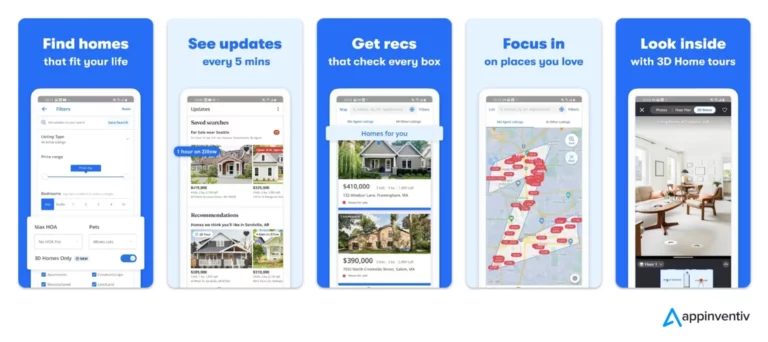
Trulia
Trulia is a prominent real estate marketplace that utilizes AI to provide personalized property recommendations and enhance the user experience. By analyzing user behavior, search history, and preferences, this AI-powered platform offers personalized property suggestions that align with individual preferences and interests.
Know: What is the Cost of Real Estate App Development Like Zillow or Trulia?
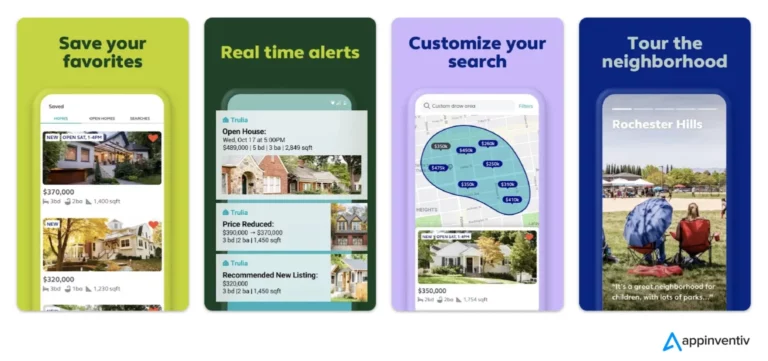
Redfin
Redfin is a technology-powered real estate broker, lender, instant home-buyer (iBuyer), title insurer, and renovations company that uses AI to provide automated property valuations. They combine AI-driven data analysis with human expertise to offer accurate valuations to realtors.

Entera
Entera, a leading example of AI in business, operates in the real estate industry and offers a residential real estate investing platform that leverages AI to provide automated processes and intelligent analytics for discovering, purchasing, and managing single-family homes. The company operates across the US market, and its platform handles over 1,000 transactions per month.
AI Integration in Real Estate: Key Focus Areas Businesses Need to Look Out For
Artificial Intelligence is expected to revolutionize the future of real estate technology by enhancing efficiency, providing deeper insights, and personalizing experiences. Here’s how AI use in real estate can be integrated across various real estate operations:
Property Valuation and Pricing
Automated valuation models (AVMs) analyze property sales, historical trends, and economic indicators.
- Automated Appraisals: AI provides rapid, accurate property valuations based on comprehensive data analysis.
- Dynamic Pricing: AI adjusts property prices in real-time, considering market fluctuations and property conditions.
Predictive Analytics for Market Trends
Machine learning algorithms assess changes in demographics, economics, and interest rates.
- Market Forecasting: AI predicts future property values and market demand, aiding investment strategies.
- Risk Assessment: AI evaluates potential market downturns and bubbles, helping stakeholders make informed decisions.
Real Estate Investment
AI for real estate investment leverages data analysis tools to evaluate property performance metrics and historical data, providing accurate ROI forecasts.
- Investment Analysis: AI identifies high-potential investment opportunities and calculates expected returns.
- Portfolio Optimization: AI manages and adjusts investment portfolios based on predicted market conditions.
Property Search and Matching
Recommendation engines and chatbots enhance the property search experience.
- Personalized Property Recommendations: AI curates property listings tailored to buyer preferences.
- Interactive Chatbots: AI-powered chatbots provide detailed property information and schedule viewings.
Virtual Tours and Augmented Reality
AR technologies pair with AI to create immersive virtual property tours.
- Virtual Staging: AI decorates empty spaces virtually, helping buyers visualize potential setups.
- Interactive Tours: AI-enhanced tours allow users to modify property features interactively.
Smart Building Management
Intelligent management systems optimize building operations to reduce energy usage and enhance maintenance.
- Energy Management: AI adjusts building systems like HVAC and lighting based on usage patterns.
- Preventive Maintenance: AI predicts when building equipment needs maintenance, avoiding disruptions.
Also Read: 12 Use Cases and Benefits of How AI is Transforming the Smart Homes Sector
Automated Document Management and Contract Generation
Natural language processing (NLP) automates the creation and management of legal documents.
- Contract Automation: AI generates and reviews legal documents, ensuring accuracy and compliance.
- Document Management: AI organizes and retrieves documents efficiently, simplifying access and audits.
Lead Generation and Customer Engagement
AI-driven marketing tools analyze customer data to enhance engagement and lead conversion.
- Predictive Lead Scoring: AI assesses the potential of leads based on interaction data.
- Marketing Personalization: AI tailors marketing efforts to individual customer profiles.
Construction and Project Management
Project management software uses AI to plan and manage construction effectively.
- Project Planning Optimization: AI forecasts timeframes and budget requirements.
- Resource Allocation: AI optimizes the use of materials and labor.
Fraud Detection and Risk Mitigation
Pattern recognition algorithms scrutinize transaction patterns to identify potential fraud.
- Fraud Prevention: AI detects anomalies in transactions that could indicate fraudulent activity.
- Risk Profiling: AI evaluates the risk levels of transactions, providing detailed risk assessments.
Maintenance and Facility Management
Predictive analytics enable proactive maintenance and facility management.
- Predictive Maintenance: AI anticipates equipment failures, scheduling maintenance before issues occur.
- Facility Optimization: AI monitors facility conditions in real-time, ensuring optimal operations.
Leveraging AI for Faster Decisions, Better Prices, and Happier Tenants
Artificial intelligence is transforming the real estate industry by reshaping how properties are bought, sold, and managed. From optimizing pricing strategies for property owners to enhancing tenant experiences and boosting agent productivity, AI enables faster decisions, better deals, and more personalized interactions.
At the same time, successful adoption requires careful consideration of challenges such as costs, data reliability, and privacy concerns. The table below outlines the key benefits, drawbacks, and potential solutions across different stakeholders in real estate.
| Category | AI Benefits | Challenges (Cons) | Potential Solutions |
|---|---|---|---|
| Property Owners – Revenue Generation | Predictive pricing using market data, seasonal trends, and comps. Faster sales at higher prices. | Requires high upfront investment in technology. Relies heavily on accurate and up-to-date data. | Invest in scalable AI systems. Provide continuous training for users. Regularly update data sources and integrate reliable feeds. |
| Property Occupants – Experience Management | Predictive maintenance and early issue detection. Automated rent collection and lease renewals. Smart building systems adjust heating, lighting, and security. Lower operating costs and fewer tenant issues. | AI can feel impersonal if overused in tenant interactions. | Balance automation with human support to preserve personalization. |
| Agents – Productivity & Sales | Automated lead sorting and prioritization. Custom recommendations and instant market updates. Handles paperwork and automates follow-ups. Identifies trends early for better positioning. Enables agents to manage more clients and close more deals. | May introduce bias in recommendations if not audited. Raises data security and privacy concerns. | Conduct regular audits and update AI models to reduce bias. Implement robust cybersecurity measures. Ensure compliance with data privacy regulations. |
| Overall Industry Impact | Automates tasks, freeing agents for relationship-building. Improves marketing with personalized campaigns. Enhances lead generation and conversion. Improves tenant/buyer experience with faster, more accurate support. | High costs of adoption. Risk of errors from poor data. Potential for customer experience to feel less human. | Scalable investments. Regular audits and monitoring. Maintain hybrid AI-human approach. |
How Generative AI in Real Estate Market Will Transform the Market Dynamics
According to McKinsey, Generative AI applications in real estate is set to shake up the real estate industry in a big way by making processes more efficient, personalizing how customers are served, and opening up fresh ways to make money. As this technology keeps improving, weaving it into different real estate processes signals a major change in how properties get marketed, managed, and developed, ultimately affecting the overall future of real estate technology..
Here are some of the potential impacts of Generative AI in real estate market that businesses can expect:
| Impact Area | Impact on the Industry |
|---|---|
| Enhanced Customer Engagement | Powers chatbots and virtual assistants for immediate, context-aware support, boosting client engagement. |
| Creative Content Generation | Automates creation of marketing materials, designs, and virtual tours, enhancing property visualization. |
| Data Synthesis and Insight Generation | Analyzes unstructured data to provide actionable insights for market analysis and investment decisions. |
| Operational Efficiency | Automates routine tasks like document analysis, freeing up resources for more strategic roles. |
| Strategic Decision Making | Uses predictive capabilities to assist in investment decisions and market trend identification. |
| 3D Floor Plan Generation | Creates detailed architectural layouts and floor plans from simple property descriptions or sketches. |
| Virtual Property Staging | Generates photorealistic furniture and décor in empty property photos across multiple design styles. |
| Marketing Copy Creation | Produces compelling listing descriptions, social media posts, and advertising content automatically. |
| Contract Document Generation | Drafts lease agreements, purchase contracts, and legal documents with customized terms and clauses. |
| Neighborhood Analysis Reports | Synthesizes market data into comprehensive area reports highlighting investment potential and risks. |
As generative AI keeps getting better, the benefits of AI in real estate will likely see these technologies become even more embedded in everyday work, delivering sharper analytics, more tailored client interactions, and creative fixes for old problems. This integration of artificial intelligence in real estate doesn’t just promise to make operations run better – it’s also set to completely change the customer experience and create new ways for businesses to make money in the industry.
How Agentic AI is Transforming Real Estate Operations
Agentic AI represents the next evolution in real estate automation combined with artificial intelligence and real estate, going beyond simple task completion to autonomous decision-making and workflow management. Unlike traditional AI that responds to prompts, agentic AI in real estate operates independently to complete complex, multi-step processes without constant human intervention.
These intelligent agents are revolutionizing several key areas. In property management, they’re autonomously scheduling maintenance, coordinating with vendors, and managing tenant communications based on predefined parameters while learning from past interactions. Investment analysis has become completely automated as these systems independently research market conditions, compile comparative analyses, and even initiate preliminary negotiations on behalf of investors.
- Client onboarding workflows now run themselves – from initial lead qualification through document collection and preliminary property matching
- Transaction pipeline management happens autonomously, with systems coordinating between multiple stakeholders and escalating issues only when human expertise is required
- Vendor coordination operates 24/7 without human oversight, managing schedules, contracts, and service delivery
Real estate firms implementing agentic AI for realtors are discovering that these systems fundamentally reshape how professionals allocate their time and resources. Rather than managing routine tasks, agents can focus on high-value relationship building and strategic decision-making while intelligent systems handle the operational complexity behind the scenes.
The impact goes deeper than efficiency gains. These autonomous agents are creating entirely new service models where:
- Properties can be managed with minimal human intervention
- Investment decisions get preliminary analysis before humans even see opportunities
- Client experiences become consistently excellent regardless of time zones or staff availability
This shift represents a paradigm change from AI as a tool to AI as an autonomous workforce partner in real estate operations.
Also read: 25+ Disruptive AI Agent Business Ideas You Should Launch in 2025
The Road Ahead: Challenges and Opportunities in AI Adoption for Real Estate
Successfully navigating the challenges and capitalizing on the opportunities presented by AI and machine learning in real estate investment demands a strategic approach in the adoption of AI for realtors. Let’s examine some of the implementation challenges of AI in real estate and solutions to address them.
Regulatory and Compliance Concerns
Real estate AI implementation requires adherence to strict data privacy rules and regulations such as GDPR (General Data Protection Regulation), CCPA (California Consumer Privacy Act), PIPEDA (Personal Information Protection and Electronic Documents Act), and Fair Housing Act compliance, which vary between jurisdictions, thereby increasing implementation complexity and risk.
Solution: Close collaboration with the hired technology partner and legal experts is essential to guarantee that systems powered by AI for real estate agents comply with legal requirements and effectively solve these challenges. Strong data governance standards boost transparency and trust in AI-powered real estate operations while keeping user information safe. These proactive measures uphold ethical standards and address compliance issues, creating a positive space for AI innovation in real estate.
Implementation Costs
High upfront expenses and ongoing maintenance requirements across AI real estate solutions create significant barriers to adoption and sustainable deployment. When organizations face substantial technology investments, from infrastructure upgrades to software licensing, AI implementation struggles to deliver immediate ROI and cost justification essential for strategic decision-making.
Solution: To manage implementation costs, phased deployment and scalable pricing procedures must be implemented. Furthermore, the optimization of resource allocation made possible by investing in cloud-based solutions for AI for real estate agents allows organizations to scale more affordably and reliably. These steps enhance the overall feasibility and accessibility of AI-driven insights in real estate operations while streamlining cost management processes.
Data Quality and Security
Due to the sensitivity of financial information and personal data, ensuring data accuracy and protecting against cyber threats in real estate AI systems can be challenging and time-consuming. Poor data quality can lead to inaccurate AI predictions and flawed decision-making, while security breaches expose sensitive client information and financial records to malicious actors.
Solution: Companies should prioritize developing robust data validation protocols and comprehensive security frameworks to minimize these challenges. Utilizing encryption-driven platforms accelerates the protection process and facilitates AI in real estate operations by enabling improved data integrity and privacy compliance across various systems.
Bias and Lack of Human Intuition
The adoption and optimization of artificial intelligence in real estate are constrained by algorithmic bias and the absence of human intuitive judgment that can recognize subtle market nuances, cultural preferences, and interpersonal dynamics critical to successful real estate transactions.
Solution: Companies should invest in comprehensive bias detection systems and diverse training datasets to ensure their models for AI and machine learning in real estate investment reflect varied perspectives on AI for real estate agents – this represents the key to addressing this challenge. Establishing a robust framework of human oversight capable of handling the evolving demands of real estate can also occur through partnerships with behavioral scientists to develop specialized monitoring protocols and validation programs. These programs address algorithmic limitations while fostering inclusive decision-making and providing companies with a competitive advantage in AI-powered real estate operations.
Balancing Human and AI Roles
AI systems in real estate operations may struggle with complex decision-making scenarios, relationship management nuances, or ethical considerations that require human judgment, potentially leading to over-reliance on automation and diminished personal service when technology capabilities exceed appropriate application boundaries.
Solution: Implement hybrid workflow protocols and collaborative approaches that combine AI for real estate agents with human expertise across different operational perspectives. Regular assessment of task allocation between humans and machines and incorporating real-time performance indicators help maintain service quality during complex interactions while establishing escalation mechanisms for human expert intervention when AI confidence levels drop.
Ethical AI and Algorithmic Fairness
AI in real estate systems may inadvertently perpetuate historical biases in lending decisions, property valuations, or tenant screening processes, potentially violating fair housing laws and creating discriminatory practices against protected demographic groups.
Solution: Implement comprehensive bias detection frameworks and fairness audits throughout the AI development lifecycle. Regular algorithmic impact assessments, diverse training datasets, and explainable AI techniques ensure transparent decision-making while establishing clear accountability measures and continuous monitoring for discriminatory patterns in AI-driven real estate processes.
Integration with Legacy Systems
Real estate AI systems operating alongside existing property management platforms must navigate varying database structures, API limitations, data format inconsistencies, and outdated infrastructure standards, creating complex integration matrices that increase operational risk and implementation costs.
Solution: Develop compatibility-focused AI systems with built-in middleware solutions that automatically adapt to existing platforms. Partnership with systems integration providers and implementation of modular API frameworks enable artificial intelligence in real estate to maintain seamless connectivity while scaling across multiple legacy environments efficiently.
The Future of Artificial Intelligence in Real Estate: With Actionable Steps
The future of artificial intelligence in real estate looks like it will bring major changes and benefits of AI in real estate that will change industry dynamics completely. With AI involved, agents, realtors, property managers, and everyone else can expect more accurate property valuations, predictive analytics that predict market trends, and better personalized interactions through AI chatbots and virtual assistants.
As AI use in real estate deepens, it’s not just changing industry standards – it’s creating innovation and sustainable growth, making it a necessary technology for companies that want to redesign property management and use digital progress.
Adding AI real estate solutions can make operations smoother and improve client experiences. A structured approach makes sure the integration works well, using data-driven insights for things like valuation and lead generation.
Below is a concise roadmap for AI adoption, aligning with business goals and compliance.
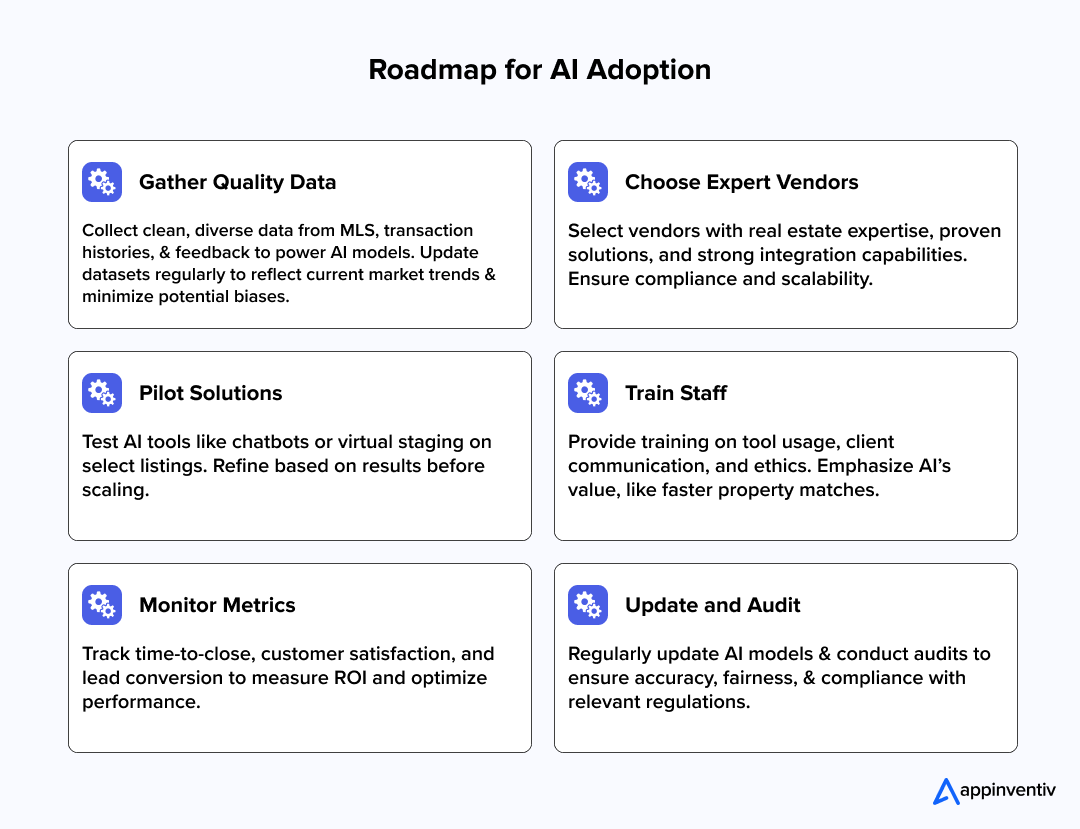
Develop Custom AI Real Estate Solutions with Appinventiv
Navigating the complexities of AI adoption, from data quality challenges to seamless integration, requires a partner with proven expertise in both artificial intelligence and real estate. At Appinventiv, a real estate app development company, offering AI development services, we don’t just build tools; we architect strategic solutions that directly address the implementation hurdles facing today’s real estate leaders.
We solve your biggest AI challenges:
- Data Accessibility and Quality – Our robust data governance transforms inconsistent formats into clean, reliable datasets that fuel precise insights for smarter decision-making
- Integration Complexity – API-driven architecture seamlessly connects AI tools with your existing systems and legacy platforms for streamlined operations
- Regulatory Compliance – Built-in frameworks automatically adapt to GDPR, CCPA, and Fair Housing Act requirements across multiple jurisdictions
- Training and Skill Gaps – Comprehensive support programs empower your teams to leverage AI effectively from day one
Key strategic advantages include:
- Generative AI solutions that transform empty spaces into stunning, furnished showcases
- Custom mobile apps delivering personalized property recommendations
- Secure transaction platforms that slash costs and enhance customer experiences
- Scalable systems that work even for teams with limited tech expertise
Your competitive advantage lies not in adopting AI eventually, but in implementing it strategically today.
Partner with Appinventiv to harness the transformative power of AI, unlock new opportunities, and stay ahead in the ever-evolving real estate landscape with innovation that sets you apart.
Frequently Asked Questions (FAQs)
Q. What are the benefits of AI for real estate agents?
A. AI transforms real estate operations through multiple key advantages:
- Increased efficiency and productivity – Automates routine tasks, allowing agents to focus on client relationships and strategic decisions
- Improved decision-making – Analyzes vast market data to provide deeper insights into trends, risks, and opportunities
- Enhanced customer experience – Delivers personalized property recommendations, 24/7 chatbot support, and virtual staging tools
- Cost savings – Reduces operational expenses through administrative automation and optimized building energy management
- Faster transactions – Streamlines property valuation, documentation, and lead generation processes for quicker deal closures
Overall, AI enhances accuracy, client satisfaction, and competitive positioning in today’s dynamic real estate market.
Q. How is AI transforming the real estate industry?
A. AI is revolutionizing real estate through predictive analytics for property valuation, automated lead qualification, and personalized customer experiences. Machine learning algorithms analyze market trends, optimize pricing strategies, and identify investment opportunities faster than traditional methods. Virtual assistants handle initial client interactions, while computer vision automates property inspections and damage assessments. For C-suite leaders, AI delivers measurable ROI through reduced operational costs, accelerated deal cycles, and data-driven decision making that enhances portfolio performance and competitive positioning.
Q. How can Appinventiv implement generative AI in real estate market?
A. Appinventiv can implement generative AI in real estate market through custom chatbot development for 24/7 customer support, automated property description generation, virtual staging solutions, and personalized marketing content creation. Their expertise includes building AI-powered lead generation systems, document automation tools, and predictive analytics platforms. By leveraging machine learning algorithms and natural language processing, Appinventiv develops scalable solutions that streamline property operations, enhance client experiences, and optimize business processes for real estate companies.
Q: What are the best AI tools for real estate agents?
A. The best AI tools for real estate agents include Zillow’s Zestimate for automated property valuations, ChatGPT for listing descriptions and client communications, virtual staging platforms like Virtual Staging Solutions, CRM systems with AI lead scoring, and chatbots for 24/7 customer support. Additionally, predictive analytics tools help forecast market trends, while AR/VR platforms create immersive property tours that enhance buyer engagement and accelerate sales processes.
Q. How to use AI in real estate investing?
A. AI transforms real estate investing through automated market analysis, identifying undervalued properties using predictive algorithms that analyze comparable sales, neighborhood trends, and economic indicators. Machine learning models forecast rental yields, occupancy rates, and property appreciation potential. AI-powered due diligence accelerates deal evaluation by processing financial documents, legal records, and market data instantly. Portfolio optimization algorithms balance risk-return ratios across multiple assets. Implement AI tools for automated valuation models (AVMs), sentiment analysis of market conditions, and predictive maintenance scheduling to maximize returns while minimizing operational overhead.
Q. What is the future of AI in commercial real estate?
A. AI will reshape commercial real estate through autonomous building management systems, predictive maintenance reducing operational costs by 30-40%, and dynamic pricing models optimizing lease rates in real-time. Expect AI-driven tenant matching platforms, automated property underwriting, and blockchain-integrated smart contracts streamlining transactions. Advanced analytics will enable predictive space utilization, ESG compliance monitoring, and portfolio risk management.
Q. Are AI tools in real estate accessible for small businesses?
A. AI is fundamentally transforming the real estate market through innovative solutions that enhance every aspect of property transactions. This technological revolution impacts multiple areas of the industry:
- Property Operations – Machine learning algorithms power automated valuations, predictive market analysis, and personalized buyer recommendations
- Marketing Enhancement – Virtual staging and AI-generated property descriptions streamline processes while reducing operational costs
- Building Management – Smart technologies optimize energy usage and maintenance scheduling, improving overall efficiency
- Customer Service – Chatbots provide 24/7 support, handling inquiries and scheduling viewings automatically
- Investment Analysis – Predictive analytics help investors identify emerging opportunities and assess market risks accurately
- Lead Generation – Advanced systems analyze buyer behavior patterns to target high-potential clients effectively.


- In just 2 mins you will get a response
- Your idea is 100% protected by our Non Disclosure Agreement.
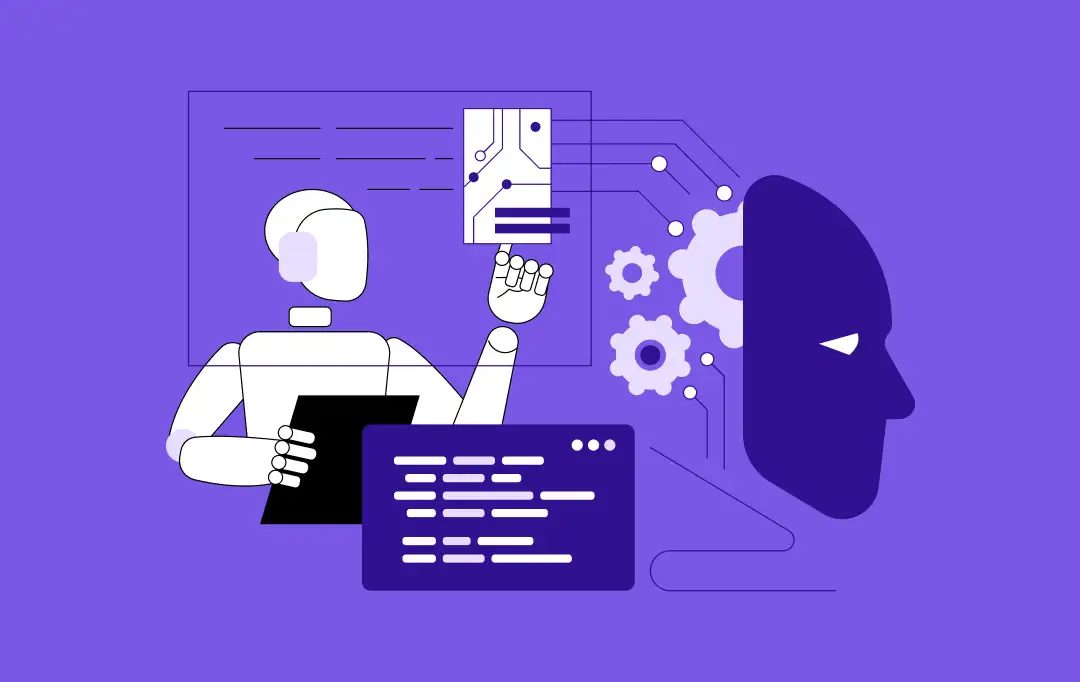
How to Build AI Agents for Insurance - Framework, Use Cases & ROI
Key takeaways: AI agents are moving insurance operations beyond pilots into scalable, regulatory-compliant AI in insurance production-grade systems. Enterprise-ready AI agents require governance-first frameworks, hybrid architectures, and deep integration with core systems. ROI compounds through reduced cycle times, improved decision consistency, and non-linear operational scalability. Insurers succeeding with AI agents treat them as operational infrastructure,…

Customer Experience Automation (CXA) for Australian Enterprises
Key takeaways: CX automation scales in Australian enterprises only when escalation, audit trails, and accountability are designed before rollout. Weak customer data and orchestration choices undermine CX automation faster than any platform limitation. AI improves CX outcomes when it supports routing and prediction, not when it replaces judgement in regulated interactions. CX automation succeeds when…
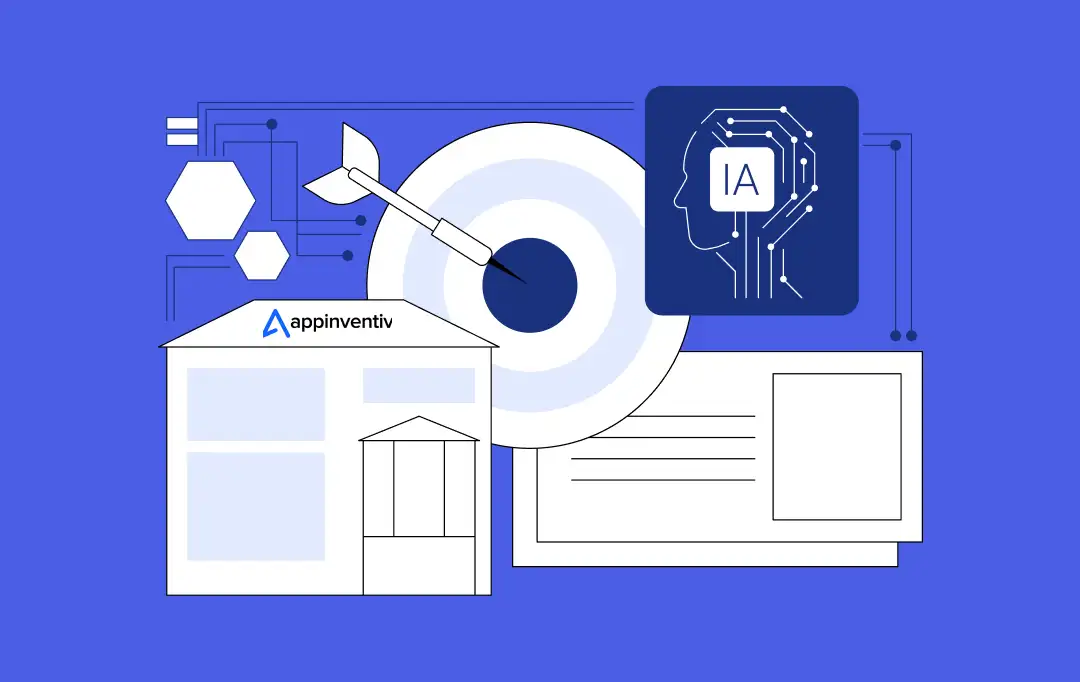
Appinventiv's AI Center of Excellence: Structure, Roles, and Business Impact for Enterprises
Key takeaways: Enterprises struggle less with AI ideas and more with turning those ideas into repeatable outcomes. An AI Center of Excellence provides structure, ownership, and clarity as AI initiatives scale. Clear roles, a practical operating model, and built-in governance are what keep AI programs from stalling. Measuring maturity and business impact helps enterprises decide…
























